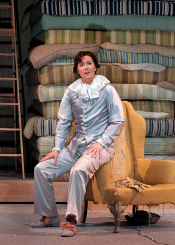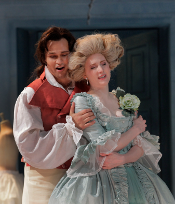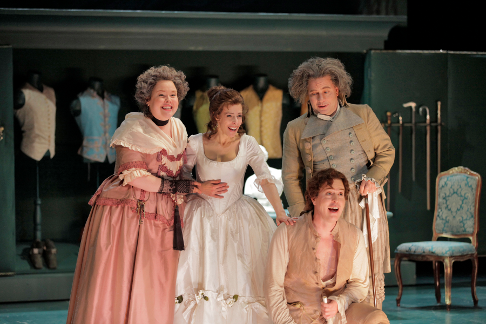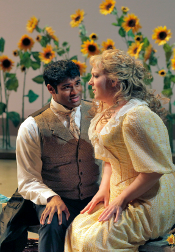20 Jul 2010
Opera’s Brigadoon — OTSL’s 2010 Season of the Sublime
At the beginning of every summer, an oasis of music and theater appears like magic in the suburbs of St. Louis.

At the beginning of every summer, an oasis of music and theater appears like magic in the suburbs of St. Louis.
For just over a month, Opera Theatre of St. Louis turns the gardens on the campus of Webster University into a paradise for opera-lovers, a place where musical integrity and dramatic innovation both bloom apparently overnight.
The 2010 season opened with a production of Mozart’s Le Nozze di Figaro which played to the company’s strengths — namely, gifted young singers singing in the vernacular of their audience in an intimate setting. In James Robinson’s appealing and generally well-cast staging, the domestic dysfunction within the Almaviva estate illustrated the larger social concern of violence between the upper and lower classes. The clever new translation by Andrew Porter contained several genuinely funny moments and the singers put the text across well.
 Jamie Van Eyck as Cherubino
Jamie Van Eyck as Cherubino
Heading the talented cast was Christopher Feigum as Figaro. Judging by his
successes in the past two seasons, Feigum was born to play this character. Not
only was his barber canny as well as caring, he also communicated the sense of
masculine competition between servant and master in both “Se vuol
ballare” and an intense stare-off with the Count leading into the wedding
procession.
 Edward Parks as the Count and Amanda Majeski as the Countess
Edward Parks as the Count and Amanda Majeski as the Countess
The counterpart of Figaro’s tension with the Count should be physical
chemistry with his bride-to-be. As her elegant and moving performance in the
role of Marie Antoinette in John Corigliano’s The Ghosts of
Versailles illustrated, Maria Kanyova is an extremely compelling singer
and actress. She is not, however, a born soubrette and it was disappointing to
see her in a role that did not showcase her talents as well as triumphs of
seasons past. Her Susanna seemed worried too often and acted as Figaro’s
magician’s assistant than his equal partner. Still, the final phrases of
“Deh, vieni” were enchanting and I look forward to hearing Kanyova
again.
In the roles of the Count and Countess Almaviva, Edward Parks and Amanda Majeski were as well-suited to their respective parts as they were well-matched as a couple. Parks imbued his Almaviva with a vanity that complemented his violent tendencies and the moment he took to compose himself after “Hai già vinta la causa” was perfection. As his wife, Majeski conveyed preternatural musical maturity with her carefully molded phrases and exquisite control over her voice. Her face was as lovely and expressive as her singing and one could almost see the memory of young Almaviva serenading his Rosina cross her face as she listened to Cherubino’s canzonetta.
 Jamie Barton as Marcellina, Maria Kanyova as Susanna, Christopher Feigum as Figaro, and Matthew Lau as Doctor Bartolo
Jamie Barton as Marcellina, Maria Kanyova as Susanna, Christopher Feigum as Figaro, and Matthew Lau as Doctor Bartolo
As the page, Jamie Van Eyck delivered said canzonetta with hormonally charged urgency. Also among the excellent supporting cast were Jamie Barton, Matthew Lau, and Matthew DiBattista. The trio took evident (and infectious) pleasure at being onstage both individually and as a group. Bradley Smoak was rather young for the role of Antonio, but his transformation from inept drunkard to the persnickety Floor Manager he played in Peter Ash’s The Golden Ticket was impressive. As his daughter, Elizabeth Zharoff showed much promise, even if her Barbarina came across as more dull-witted than young. John Matthew Myers delivered one of the evening’s best punchlines as a deadpan Don Curzio.
For the first half of the opera, a large crack in the wall and floor physically represented the discord within the household. Bruno Schwengl provided charming sets and costumes, with the exception of a singularly ugly garden for Act IV. Both lighting by Christopher Akerlind and choreography by Seán Curran were exquisite. Stephen Lord, a relatively last minute replacement for Timothy Long, presided over members of the Saint Louis Symphony Orchestra with his signature confidence and zest. The company’s Artistic Director James Robinson created several moments of amusing and innovative theater including staging during the iconic overture, a haircut given to Cherubino during “Non più andrai,” antics with a dress form, and multiple pairs of roving hands. The only moment that fell flat was the large tree that literally fell to the ground during the opera’s final moments.
As Madame Larina says in David Lloyd-Jones’ translation of Eugene Onegin, in real life there are no heroes or heroines. If that is true, then the opera is where we go to find them. As Tatyana in Kevin Newbury’s production of the Tchaikovsky opera for OTSL, Dina Kuznetsova performed with the vocal and dramatic presence of a true heroine. However, when we first encounter the character, Tatyana is a dreamy and impressionable girl. It was difficult to hear Kuznetsova’s full, womanly voice and remember she is an ingénue, especially as the mature Tatyana appeared in the opening moments of this staging, gazing upon a portrait of her younger self from the summer she met Onegin. This early revelation robbed the audience of the Pygmalion moment in Act III, when Tatyana has established herself in St. Petersburg as a woman of significant reserve and social standing.
Because the staging focused so much upon Tatyana, the role of Eugene Onegin seemed strangely underdeveloped. Little was done to answer the perturbing questions about Onegin’s nature and, as his primary characteristic appeared to be moral ambivalence, it was easy to feel ambivalent about the man himself. In the title role, Christopher Margiera’s fine singing and strong musical presence were best utilized in moments of ensemble, such as the gorgeous quartet in Act I. As Tatyana’s sister Olga, Lindsay Ammann was appropriately kittenish and her fair coloring contrasted beautifully with Kuznetsova’s dark hair. In the role of Olga’s paramour Vladimir Lensky, Sean Panikkar sang with an ardency and tenderness that left you wishing you were Olga (at least for the first act). His aria comprised of some of the most musically satisfying moments of the entire season.
 Sean Panikkar as Lensky and Lindsay Ammann as Olga
Sean Panikkar as Lensky and Lindsay Ammann as Olga
In the supporting roles of Madame Larina and Filipyevna, Gloria Parker and
Susan Shafer each performed with a winning mixture of strength and softness.
Andrew Drost’s Monsieur Triquet was a perfect complement to his turn as
Augustus Gloop in The Golden Ticket. For both roles, Drost drew on his
considerable musical finesse and physical elegance to great comic effect.
Christian Van Horn, an OTSL favorite, was a young but dignified Prince
Gremin.
As the first peasant, Jeffrey Hill led a chorus of very well-prepared, organized, and happy peasants. In particular, the girlishness of the women’s chorus was used effectively to underscore Tatyana’s brooding nature. Conductor David Agler led the cast and orchestra in a performance memorable for its musical integrity from start to finish.
The sparse wooden sets designed by Allen Moyer, although attractive, did little to illustrate the scope of the Larin estate or to differentiate between the provincial and St. Petersburg interiors. That said, the minimalist horizontality provided a perfect frame for the bleak moments of Lensky’s aria and the subsequent duel. Moreover, the transition from exterior to interior for the party scene was a little piece of theatrical magic. Martin Pakledinaz’s handsome costumes were enhanced by Tom Watson’s especially naturalistic and effective hair and makeup.
To the company’s credit, it is nearly impossible to assess two of the four festival productions without considering the other two. Each staging complements the others and the young artists (both onstage and off) benefit from this cross-pollination as much as the company’s devoted followers. By the end of the season, it is hard to imagine the gardens empty and the theater fallen silent. Then, like Brigadoon, it all is gone. Luckily for us, we don’t have to wait 200 years for the next season of enchantment.
Alison Moritz
Marriage of Figaro
Figaro, servant to Almaviva: Christopher Feigum; Susanna, Rosina's maid and Figaro's intended bride: Maria Kanyova; Doctor Bartolo: Matthew Lau; Marcellina, his housekeeper: Jamie Barton; Cherubino, page to the Countess: Jamie Van Eyck; Count Almaviva: Edward Parks; Don Basilio, music master to the household: Matthew DiBattista; Rosina, Countess Almaviva: Amanda Majeski; Antonio, gardener and uncle to Susanna: Bradley Smoak; Don Curzio, lawyer: John Matthew Myers; Barbarina, Antonio's daughter: Elizabeth Zharoff; Two peasant girls: Rebecca Nathanson and Irene Snyder. Conductor: Timothy Long, Gregory Ritchey (June 16); Stage Director: James Robinson. Set and Costume Designer: Bruno Schwengl. Choreographer: Seán Curran. Lighting Designer: Christopher Akerlind.
Eugene Onegin
Tatiana, daughter of Madame Larina: Dina Kuznetsova: Olga, her sister; Lindsay Ammann: Madame Larina; Gloria Parker; Filipyevna, the family’s old nurse: Susan Shafer; A Young Peasant: Jeffrey Hill; Vladimir Lensky, a poet: Sean Panikkar; Eugene Onegin, a friend of Lensky: Christopher Magiera; A Captain: Adrian Rosas; Monsieur Triquet, an old friend of the Larina family: Andrew Drost: Zaretsky, a retired officer: Aubrey Allicock; Guillot, Onegin’s valet: Nick Fitzer; Prince Gremin: Oren Gradus. Conductor: David Agler. Stage Director: Kevin Newbury. Set Designer: Allen Moyer. Costume Designer: Martin Pakledinaz. Choreographer: Seán Curran. Lighting Designer: Christopher Akerlind.